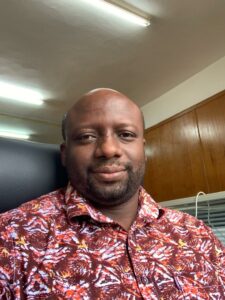
Dr. Benedict Weobong has degrees in psychology, mental health epidemiology from Universities of Ghana and London. A global mental health epidemiologist and academic, Dr. Weobong’s research involves instrument development, perinatal depression, alcohol and substance use, mental healthcare systems, and health promotion interventions. His research portfolio is informed by the principles of global mental health along three strands (developing and evaluating psychological treatments; implementation research to scale up evidence-based interventions for mental disorders in routine primary health care settings; and school-based health and wellbeing programmes), tied together through the innovative use of task-sharing strategies. His current research laboratory holds three important activities: developing a step-up care intervention to treat depression and anxiety among adolescents in Ghana (https://www.kcl.ac.uk/research/african-youth-in-mind);evaluating the implementation of a routine health check-up programme for adolescents; and building a critical mass of global mental health researchers through doctoral and post-doctoral training (https://amari-africa.org). His research has been funded by NIHR, GCRF, Fondation Botnar, WHO, FCDO, and Wellcome Trust.
Dr. Weobong is currently an Academic Editor at PloS ONE, and Editorial Board Member at BMC Psychiatry.
Prior to joining York, Weobong taught courses and supervised both undergraduate and post-graduate students in social and behavioural sciences at the School of Public Health, University of Ghana.
Research keywords:
measurement; the aetiology and treatments of mental health conditions; immuno-psychiatry; social determinants of mental health conditions; psychological treatment development; task-sharing (human interface and digital) mental health interventions; implementation research; evidence-based interventions; climate change-mental health nexus
Themes | Global Health & Humanitarianism |
Status | Active |
Related Work |
N/A
|
Updates |
You may also be interested in...
Hot off the Press – Recent Publications by Dahdaleh Institute Researchers
Research by Dahdaleh Institute Research Fellow James Stinson and his partners has been featured as a case study by the Canadian Climate Institute as part of their "Indigenous Perspectives" series, which showcases exemplary Indigenous work ...Read more about this Post
Recap – Water Resource Management in Freetown, Sierra Leone
On January 24, 2024, Brian Waters, a PhD Candidate in Geography at York University, shared his journey and findings from a study conducted in Freetown, Sierra Leone. Brian's inquiry was deeply inspired by the stark ...Read more about this Post
2024 World Health Assembly Recap
Last month, the 2024 World Health Assembly Simulation held their second annual simulation from May 1st to May 3rd at York University. This year's theme of the 2024 WHA SIM was “Toward a One Health ...Read more about this Post
